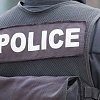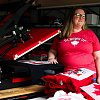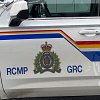It's nearly motorcycle season and the topic of lane filtering keeps surfacing.
With May’s Provincial elections around the corner, the B.C. Coalition of Motorcyclists (BCCOM) is lobbying in favour of allowing lane filtering in B.C.
BCCOM’s mission is to reach as many electoral candidates as possible before May 9th.
Bill Downey is an instructor with the Kelowna District & Safety Council. While the District has no formal position on the issue of lane filtering, Downey offered his views.

“So the speed is a very, very significant factor in this,” said Downey.
“What the research is telling us is that lane filtering can be done effectively without increasing crash outcomes if it's done in a very disciplined fashion.”
But Downey says the issue will be finding a way to ensure that lane filtering is performed in just that - a safe and disciplined fashion.
“People seem to be taking license with the speeding laws as they are so I can't see that they would be very disciplined about whether they're lane filtering or whether they're lane splitting,” he said.
The terms lane filtering and lane splitting are often used interchangeably. However, there is a significant difference between the two.
Lane filtering refers to motorcycles moving between the two lanes at low speeds while traffic is stopped or moving slowly.
Lane splitting refers to riding up between lanes at higher speeds than both vehicles.

“Lane filtering, especially below 30 kilometres per hour, with no more than a 10 - 20 kilometres per hour differential, is found generally to be relatively safe,” he said.
“Lane splitting, especially at highway speeds (80 kms per hour plus) is universally recognized to be a dangerous action with significant negative crash outcomes,” said Downey.
Another concern of Downey's is that the safe portion of lane filterers represents a small subset of riders that are mostly commuters, riding at lower speeds and using high-quality safety helmets.
He’s concerned the research doesn’t represent the recreational riders who he believes, tend to be less safety-conscious than commuters.
“It's done by people who are well-equipped and who are operating within some very specific speed parameters.”
But he’s also concerned with putting pedestrians at risk.
“Their collision and injury rates are increasing relative to drivers and motor vehicles where collision rates are decreasing or the injury rates are decreasing."
"We don't want to put pedestrians at further risk I should think.”

Some of the arguments BCCOM raise for allowing lane filtering include the idea that safety will increase and pollution and traffic congestion will decrease.
"Our provincial motorcycle registrations are three per cent of overall vehicle registrations, yet motorcyclists are 11 per cent of the fatally-injured road users," said Downey.
He also adds that the Southern Interior population of motorcylists make up a significant portion of the motorcyclists injuries in B.C.
"This area has 16 per cent of the (motorcycle) population, but 35 per cent of the fatal motorcyclist injuries, and the overwhelming majority of those injuries are sustained in urban crashes (filtering zones)," said Downey.
So, essentially Downey believes there would have to be a way to monitor the lane filtering speeds, ensure riders are using proper safety equipment, and operating a lower speeds.
“People seem to be taking license with the speeding laws as they are so I can't see that they would be very disciplined about whether they're lane filtering or whether they're lane splitting,” he said.
“In light of this, I'd be rather surprised to see the decision-makers feeling very ready to legislate in favour of filtering, which is seen by the public as a dangerous action, research and experience elsewhere notwithstanding," said Downey.
Both
Australia and
California have put significant efforts into researching the pros and cons of lane filtering.
Some of the research supports lane filtering as a safer option to riding in slow moving or stopped traffic.
KelownaNow has also reached out to BCCOM but has not received a reply.
















